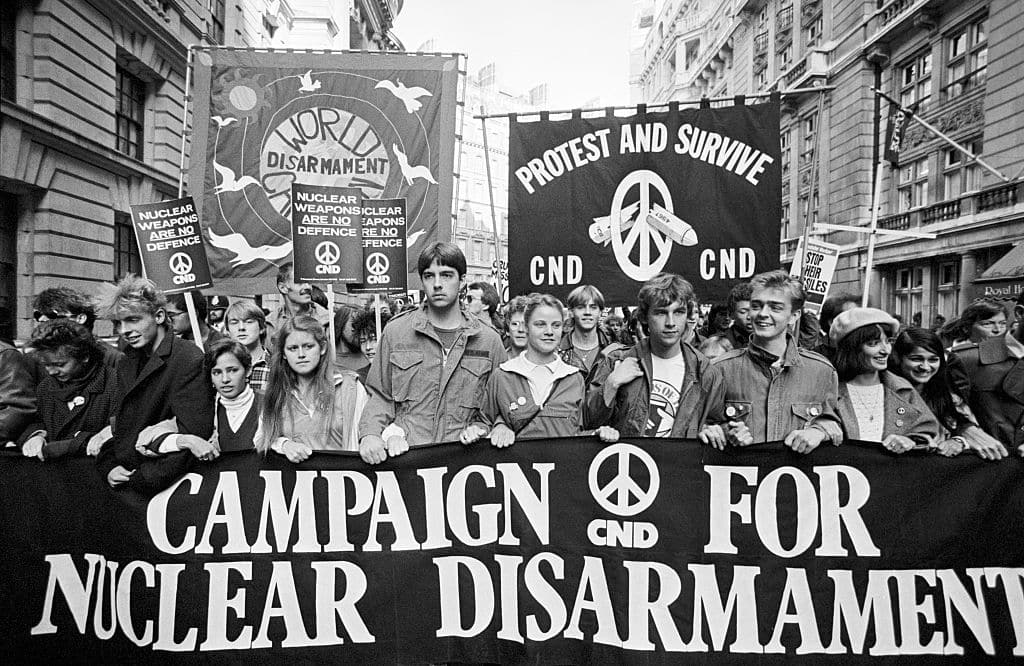
Campaign for Nuclear Disarmament protest organized in the streets of London. (Photo by Jean Guichard/Sygma/Sygma via Getty Images)
World peace spoiler alert. On the last page of 2021’s “Never” by Ken Follett, a fictional U.S. president is weeping. “She was possessed by a helpless grief so overwhelming that her whole body shook,” Follett writes. “She felt that her heart would burst and she would die.” That’s what happens when you kill 50 million people. Feeling she had no alternative, she had just ordered a savage nuclear strike against China. As the story ends, Beijing’s smaller but devastating retaliatory strike is inevitable.
The crisis begins when a U.S. soldier on the border between the Sudan and Chad is killed by a jihadist using a North Korean rifle supplied by China. From little things, big things grow, sang folksinger Paul Kelly. In a preface, Follett said he was inspired by his study of World War I, when webs of alliances and treaties invoked after a political assassination drew European nations into a conflict no one wanted. In “Never,” the U.S. and China go to war because of their obligations to defend South and North Korea.
I’m a little miffed at the friend who suggested I read it. I anticipate bad dreams. Because it’s plausible and timely. In an interview, Follett said that while a friend said he should write about Russia, he picked China because, he thought, Moscow’s aggressive days were past. Wishful thinking by a master storyteller. A “Never” scenario in Ukraine is a definite maybe. I read an article today saying that Putin could decide at any point that massive U.S. aid to Ukraine was an act of aggression against Russia. In Follett’s tale, leaders who have been backed into a corner launch nukes and chemical weapons because they have nothing to lose. We don’t hear as much about Putin’s nuclear threats as we did six months ago. But imagine what he might do if the Ukrainians got the better of him, and he thought his hold on power was slipping away.
“Never,” of course, is fiction. It characters are captives of events contrived by an author making a point. Neither you nor I can conceive of pushing a button that would launch a missile that would kill a million people. It’s hard to believe that President Biden or even Putin would do so. But I’m afraid they would. Any morning, we could awaken to the news that it’s happened in Ukraine — that our friends have been attacked, and so we felt we had to respond. U.S. leaders pledged to defend their country could easily be persuaded by the argument that failing to act would be catastrophic for their own people. But it’s a logic imposed only by the weapons themselves. Before 1945, it was inconceivable that a leader would have ten minutes to decide to launch an attack in order to prevent the inevitable destruction of their whole country. Before the nuclear age, the means of such devastation didn’t exist.
Such decisions are beyond decent humans’ moral capacity. We’ve unlocked a power to which we have no right, because it would always be wrong to use it. It was a sin to invent these weapons, and it’s a sin to stake our security on them. If they’re not abolished, they will be used again. It’s time for people of faith to put nuclear arms reduction — by every country, everywhere — at the top of the agenda at our conventions, synods, and conferences. It probably won’t help much. But we have to try. Because it’s not “Never.” It’s only a matter of time.
